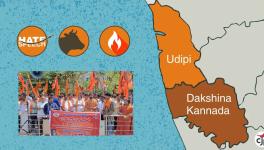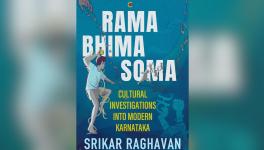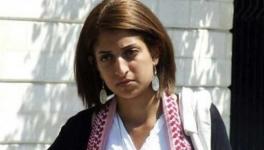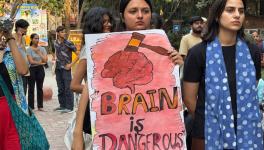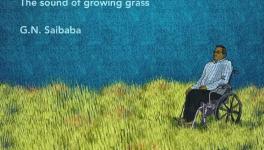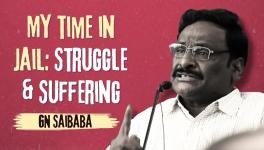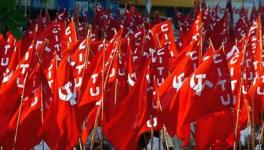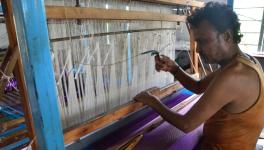Tale of Persecution: Vittala Malekudiya Spent 9 Years Trying to Prove he Wasn’t a Naxal
Vittala Malekudiya writing exams in handcuffs
On March 2, 2012, the police and the Anti-Naxal Force arrived at Kuthluru village, located in Dakshina Kannada district in Karnataka, where Vittala Malekudiya lived. They entered his modest home, assaulted his father and confiscated household items. This was done on the pretext that Vittala and his father harboured Naxalites and had joined a criminal conspiracy to assist them in waging war against the State. At the time, Vittala was a journalism student at Mangalore University.
The police emptied Vittala’s house to gather evidence. They confiscated items including bed sheets, plates, toothpaste, tins with sugar and coffee, mobile phone, chargers, paper cuttings and a book on Bhagat Singh. This book was presented before the judge as evidence of his Naxalite leanings. Along with this, there was a letter written by him warning that his village would boycott upcomingzillaandtalukpanchayat polls if elected leaders did not provide basic facilities to the village. This handwritten letter was confiscated as Naxalite literature.
Vittala and his father were in jail for four months in 2012 and charged with sedition as well as Section 19 and 20 of the Unlawful Activities Prevention Act (UAPA).
While he was in jail, Vittala’s exams were approaching, but the University had refused to give him the exam application on the pretext that a student must appear in person to collect it. Speaking toNewsclick, his lawyer Dinesh Hegde Ulepady, said, “I had approached the sessions court for regular bail so that he could write his exams. However, the court denied bail but provided instructions to the lower court to allow him to write his exams”. It was this intervention that forced the University to allow Vittala to write his exams in the presence of a police escort.
However, on the first day of his exam, the police did not remove his handcuffs and he was made to sit with his classmates and write the paper in handcuffs. When this picture was leaked to the media, there was an outcry, after which he was allowed to write his remaining exams without handcuffs.
When the trial began, the police only had the materials seized from his house as evidence. The court observed that all those materials were day-to-day household items and stated that having a book on Bhagat Singh was not illegal. The court also concluded that the prosecution had failed to produce any incriminating evidence against the two accused. Vittala and his father Lingappa were finally acquitted on October 21, 2021.
However, his lawyer has filed a plea for an honourable acquittal. He said, “This is a false case made by the police, that is why I wanted an honourable acquittal so that the reputation and honour of Vittala can be restored and he can go about his life without this episode affecting his future plans.” The sessions court has denied this plea, but Ulepady plans to approach the high court for an honourable acquittal.
This case should have been a colossal embarrassment to the police, but no action has been taken against any police personnel.
Here is an excerpt from an interview with Vittala Malekudiya, who struggled for about a decade to prove his innocence:
1.Could you tell us about your village Kuthluru?
My village is located in Belthangady taluk around Kudremukh National Park in South Kannada district. Since it is situated in a national park, it is primarily a forest, and we have to travel around six kilometres on foot to reach the nearest town. There are around 30 households in my village, and we all belong to the Malekudiya adivasi community.
2. Could you tell us more about your community?
Our community has a population of around 10,000, and we mostly reside in forested areas of Karnataka. Around 80% of our community subsists on forest produce. Recently, some people have started cultivation of areca nuts, coconuts and bananas.
3. Could you take us through the day of your arrest?
The police had been harassing us for several years before my arrest itself. They would barge into our homes; when we returned from town, they would check our bags. In the past, they had also thrashed people and filed cases against them. The adivasis of Kuthlur were scared of what the police might do next. On March 2, 2012, they picked up two people and took them around the forest to identify the houses of residents. They had barged into several homes and gone through their belongings. They entered my house as well and beat my father with a stick, causing a fracture on his leg. At this time, I was a student in Mangalore. I immediately went to the village and saw that they had not even provided any treatment for my father. They arrested us the same day. After this, they confiscated everything from our house, including bed sheets, plates, cups, toothpaste, coffee powder, a book on Bhagat Singh, and did not leave anything behind.
4. Who were the people and organisations that supported you?
When my father and I were arrested, a few organisations like the Democratic Youth Federation of India (DYFI), the Communist Party of India (Marxist) [CPI(M)], the Students Federation of India (SFI), and adivasi rights organisations stood firmly by my side until my acquittal. MB Rajesh, former MP from Palakkad, visited my village and enquired into the well-being of the people. Before him, no Member of Parliament had ever set foot into our village. He also brought up the issue of my arrest in Parliament. Prakash Karat (CPIM leader) met me in jail. Brinda Karat came to Bangalore to call for my release and took part in adharnaoutside the residence of the then chief minister, Sadanand Gowda. Other activists like BM Bhat, Shiva Kumar, Muneer Katipalla, GK Govinda Rao, Shekhar Laila, and journalist Naveen Soorinje supported me through the years. All the members of my village stood by my side. And finally, I would also like to mention my lawyer, Dinesh Hegde Ulepady, who fought my case pro bono. Even when I had lost the opportunity to write my exams, he went to court, filed an affidavit and ensured that I took my exams.
5. How long were you in jail?
We were in jail for around three to four months (in 2012). After this, we were released on bail.
6. Can you speak about your journey into political activism?
There are various problems in my village. Even today, there are no roads, no electricity, and no basic infrastructure. The police used to force us to vacate the forest permanently. They used to come to our homes every day and threaten us with consequences if we did not vacate our homes and the Kudremukh National Park. Some NGOs used to work in the region; they also used to trouble us and tried to make us leave the forest. We were opposed to all these attempts. We would not leave the forest even if they offered 10-20 lakh rupees. We told the government to provide basic amenities to our village and that we would not go. In this context, we were introduced to some organisations that came forward to protect our rights. So, even before my arrest, I had participated in struggles to protect adivasi land.In my college days, I met some journalists and helped them write reports about Kuthlur; this became a problem for the police. Until this point, nobody knew what the police were doing in our village.
7. You were first arrested when the BJP was in power, but your charge sheet was filed after the Congress party came to power and Siddaramaiah was CM. Did this come as a surprise to you?
Yes, I was surprised because the Congress is the so-called progressive party and the BJP is the so-called communal party. But the BJP had not filed the charge sheet and I even got bail back then. In 2015, the charge sheet was filed after the Siddaramaiah government came to power. The agenda of all parties is the same -- the people should not ask for their rights.
In December, 2010, there werezillapanchayat andtalukpanchayat polls. In this context, I put forth ten demands in a letter and wrote that our village would boycott the elections if the demands were not fulfilled. Our village lacks basic infrastructure, there is no electricity or roads. There is anAnganwadi, but it lacks facilities. We demanded a compound wall as well as toilets to be built. Also, since our village is remotely located, we receive ration once a month; so, we demanded that we should get it at least twice a month. We also wanted title deeds to our lands. There is a school nearby; we asked for a teacher to be appointed there. We asked them to stop the harassment by the police. I put forth such demands in the letter, and I had a copy of it at home. The police collected it as evidence of Naxalite literature. However, they finally had to accept in court that this was not related to Naxalite activity.
9. In what ways have these false cases affected your village?
Whenever we ask for basic facilities, the police file cases against us. Twenty years ago, the same thing had occurred. They locked up 12 people from my village then. A few years before my arrest, a person from my village called Shashidharan was jailed for a month for allegedly possessing Naxalite literature. A few months ago, four people were arrested under the Wildlife Preservation Act for building a village road. They were fed up with repeatedly asking for road connectivity and decided to repair and build a path to the village themselves.
10. Where are you working presently?
I work with a newspaper called Prajavani. They gave me a job in 2019 even when I was accused of sedition. I was posted in Mangalore for a year, then Tumkur and now Bangalore. I plan to do whatever possible to improve the lives of people in my village.
Get the latest reports & analysis with people's perspective on Protests, movements & deep analytical videos, discussions of the current affairs in your Telegram app. Subscribe to NewsClick's Telegram channel & get Real-Time updates on stories, as they get published on our website.









